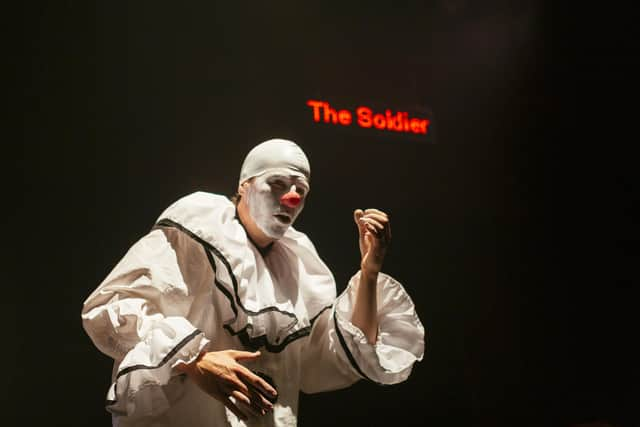Edinburgh Festival Fringe reviews: Project Dictator | Gulliver | Alphonse | Caste-ing | Kvartetto
Project Dictator ****
Pleasance Courtyard, until 27 August
This deceptive new piece of narrative circus theatre from duo Rhum + Clay is an exploration of the rise of populism and eventually fascism in two very different but somehow perfectly matched halves. The first of these is the crowd-pleaser, the element that draws the audience in – the part where bold comedy, a seemingly harmless lack of seriousness and the relentless, intentionally overbearing nature of the boldest character onstage thoroughly buys the audience in to what’s happening.


In other words, it’s very much like populism, particularly that of the social media age. Martin (the company’s co-AD Matt Wells) is a suited performer who wants to make a crisp bit of witty political theatre named How to Solve the Problems. It will be dense and complex – after all, he reminds us, “theatre is not always meant to be enjoyable” – and all the hard onstage graft will be done by his onstage partner Jeremy (other co-AD Julian Spooner); 99% of it, in fact. At the side of the stage, their silent accomplice Kevin (Khaled Kurbeh) provides musical accompaniment.
Advertisement
Hide AdThis is boring Jeremy, though, and he’s sick of doing all the work. Demanding support from the audience in very slick and amusing interactive fashion, he coerces Martin to turn the show over to him, and it becomes an increasingly, intentionally desperate piece of comedic farce, with a student-friendly absurdist tone reminiscent of the Mighty Boosh. Jeremy just wants to have fun, while Martin’s managerial intellectualism is steamrollered in increasingly bullying fashion.
Then Martin is finally overthrown completely, and the tone shifts entirely with the fall of a transparent curtain and the pair’s reappearance against a utilitarian grey lighting set. They’re in their underwear, hooded, forced by an unseen voice to dress as Pierrot-style clowns and execute a range of traditional mime pieces named things like The Soldier and the Boy and The Shadow.
When they get it wrong a red-lit alarm sounds, and unspecified punishment awaits. Give in to entertainment as politics, the group seems to be saying in pitch-perfect tone, and find art suppressed and neutered entirely. David Pollock


Gulliver ****
Underbelly Cowgate, until 28 August
Gulliver’s Travels, written by Jonathan Swift in 1726, is most often adapted as a children’s story that focuses on just two of its parts: the hero’s adventures in Lilliput, where the people are six inches high, and in Brobdingnag, the land of giants. This adaptation for adults, by Fringe regulars Box Tale Soup, is more ambitious, taking in much more of the scope and complexity of Swift’s text.
Box Tale Soup had success at the Fringe in 2018 and 2019 with adaptations of other classic texts, The Turn of the Screw and the Grimms’ fairy tales. The cast of three – Noel Byrne, Antonia Christophers and Mark Collier – worked together to adapt Swift; Byrne and Christophers wrote the sea shanties that separate the different adventures, and built the puppets.
They take Gulliver not only to Lilliput and Brobdingnag but to Laputa, a flying island, where the people are preoccupied with abstract ideas, and to the country of the Houyhnhnms, formal and courteous horses who rule over the barbaric Yahoos (men). In each land, Gulliver and those he encounters must try to overcome the prejudices around otherness and reach some understanding of one another.
Advertisement
Hide AdThe company has taken a long and complex text and enticed from it a lucid and pure adaptation that is absurd, funny and sad. It is simply and cleverly staged on a set built entirely from re-used and recycled materials; puppets are used when helpful, and not when they aren’t. A strong performance by Noel Byrne as Gulliver acts as an anchor among so much fantasy, reaching the end of his journey wiser and sadder, knowing how bad people are at accepting difference, and having seen too much ever to relish going home. Susan Mansfield
Alphonse ***
Pleasance Courtyard, until 28 August
For the first 30 minutes, at least, I had high hopes of Alphonse. Acclaimed Lebanese-Canadian playwright Wajdi Mouawad’s 1996 play is the whimsical and occasionally profound story of a dreamy teenage boy who goes missing somewhere between the real world and the world of the imagination.
Advertisement
Hide AdCanadian actor Gabe Maharjan does a inspired job of fielding dozens of characters, from Alphonse’s family and friends, to the police inspector who is looking for him, to his imaginary friend Pierre-Paul René (“a gentle boy with a one-note voice who is not surprised by anything”). With nothing more than a table, a handful of props and quite a lot of popcorn, he creates an earnest, innocent and ultimately kindly world. Some of the writing is lovely.
But the longer it goes on (and it does feel like it goes on for quite a long time), the plot becomes increasingly convoluted and Maharjan’s earnestness persists, even as the story gets sillier, with talking vacuum cleaners and brontosauri grazing in long grass. There’s a profound question in there somewhere about growing up and finding one’s purpose in life, but I can’t figure out what it is. Susan Mansfield
Caste-ing ***
Roundabout @ Summerhall, until 28 August
Performers of all kinds face challenges finding work, but particular issues affect women of colour. Three black women work through their experiences in Nicole Aqcuah’s show for Nouveau Riche, an episodic high-energy combination of song, rap, beatboxing and spoken word.
As well as the general problem of being cast according to the male gaze, Rima Nsubuga, Yemi Yohannes and Stephanie Da Silva discuss being offered parts like “Zulu number one” and “slave girl number two”, being the token black person hired for “diversity purposes”, and being given notes like “try and be a bit more black”, or “don’t be so black, just general urban” – all by an industry that claims not to be racist.
These women-with-attitude need to be doing more than just complaining about how tough it is, and they are. They come at the subject from all angles, with humour, anger and vulnerablity. And with ideology: “Is it my job to educate people on white privilege?” they ask. It’s more like a series of performances than a narrative, and the continual changes of style make it feel disjointed at times, but the energy and talent of the three performers shine out. Susan Mansfield
Kvartetto ***
Summerhall, until 24 August
Saying that this piece of interpretive dance by Finnish choreographer Kati Raatikainen feels radical is more of a comment how on how society views those perceived as being “different” than it is on the performance of the four “intellectually disabled” individuals who take centre stage. In a year when the purpose of Edinburgh’s open-access festival has been put under the microscope, Kvartetto is an example of the importance the model plays in pushing artistic boundaries.
Advertisement
Hide AdStarting with three of the performers wearing headphones, switched on by a fourth who deals with the majority of the musical cues, they dance to music the audience can’t hear, seemingly unaware of each other, never mind any onlookers.
This disconnect is soon removed as the headphones come off, with each of the dancers given a chance to shine, both by themselves and each other, interpreting a range of emotions through their movements, from muscular street dance to flowing ballet. Their talent shines through, even if it may not suit the cookie-cutter conventions of the industry.
Advertisement
Hide AdIt all ends with a celebratory, poignant and funny Strictly-sequinned ballroom number, set to Whitney Houston’s I Will Always Love You. As the confetti flies, the audience is left in no doubt that disability should never be a barrier to the joy of performance. David Hepburn